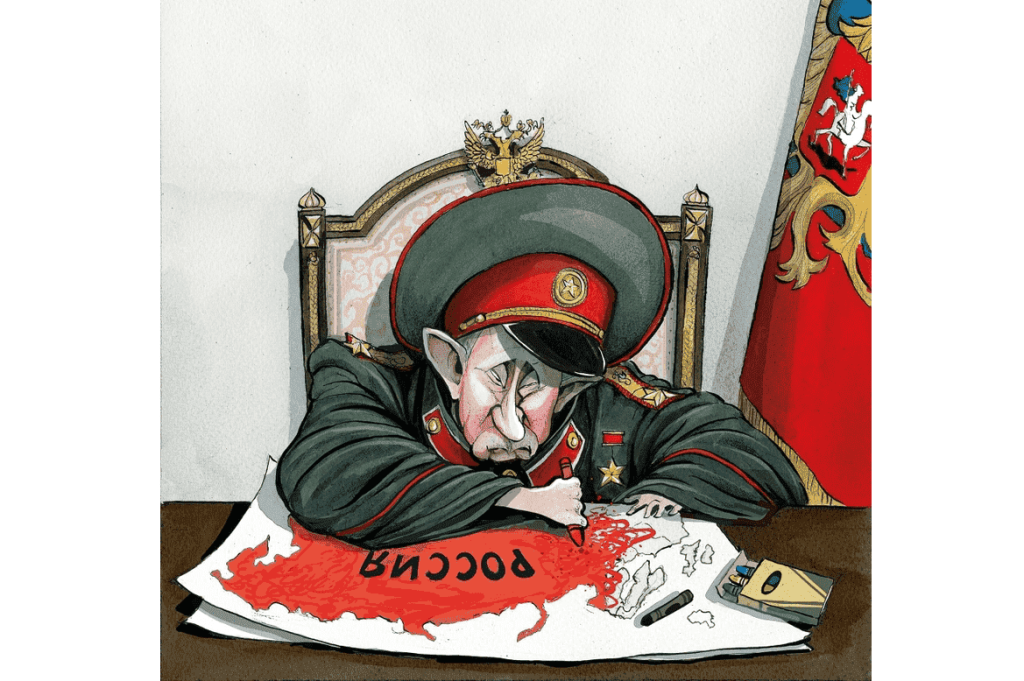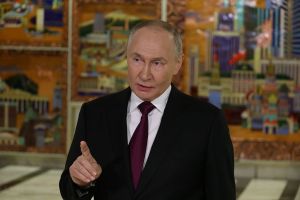Vladimir Putin’s latest escalation over Ukraine not only demonstrates that even he doesn’t think he’s winning the war but what happens when a leader knows he has to do “something” but doesn’t quite know what.
Momentum was, after all, no longer on his side. He seems to have hoped that over a hard winter, either Ukraine would lose the will to fight or the West would succumb to “Ukraine fatigue.” However, Ukraine’s impressive counter-offensive in the north-east not only confirmed Kyiv’s continued and even growing will and ability to fight but also galvanized Western support.
Meanwhile, the West is not alone in feeling the pain. Putin went to Samarkand for a summit of the Shanghai Cooperation Organization hoping for some political, if not practical endorsements for his war on the West. Instead, China, India and Turkey all pressed him to end the war quickly, and he was forced publicly to recognize their qualms.
Putin returned to Moscow, his isolation emphasized by the global gatherings of leaders at the Queen’s funeral (to which he was not invited) and the United Nations General Assembly (to which he wouldn’t dare go). He had been dissed at the autocrats’ club, his stock with the elite at home was falling, his claims that the “special military operation” was going to plan sounded increasingly hollow.
This seems to have been enough to push him off the fence he had been straddling for so long. Hawks and the military had been demanding a full declaration of war and a mobilization; his own political technologists were warning that while the public were willing to countenance the conflict so long as it didn’t impinge on their lives too much, this would alarm and alienate them.
True to his usual form, faced with unpalatable choices, Putin stalled as long as he could. Samarkand seems to have forced him to act, but what we see is hardly a coherent and credible plan.
The “referenda” will have no international legitimacy, and likely alienate China further. Beijing has clung to the principle of the inviolability of sovereignty, which it uses as the basis of its claim to Taiwan. They will also be self-evidently farcical, not least as they will notionally be held in territories which are not even wholly under de facto Russian control.
Putin’s hope is presumably that annexation, coupled with heavy-handed threats of nuclear retaliation against attacks on “Russian soil,” will either deter Kyiv or scare the West into pressurizing the Ukrainians to hold back. Neither seems at all credible, though. Given that actual nuclear strikes are, while not wholly impossible, still highly unlikely, Putin once again looks as if in effect he is calling his own bluff.
As for the partial mobilization that, according to defense minister Sergei Shoigu, will see 300,000 reservists called to arms, there is little evidence that the military could genuinely absorb and field so many.
Russia has 25 million reservists notionally on the books, but in practice only 100,000 or at most 150,000 could really be called to arms. After all, they will need to be given refresher training, but the professional soldiers of the training cadres have largely been sent to the front in the desperate search for troops. If these troops are housed in tents over the winter, their health and morale will suffer dramatically, but there are no large, empty bases near the war zone, not least as the Russian army is no longer geared for mass mobilization. They will also need to be armed, which will likely mean 1970s and 1980s kit pulled out of stockpiles, which will need to be reconditioned before issue.
All told, it will take perhaps three months to raise new forces, of likely undertrained and undermotivated reservists. While they will genuinely make a difference on the battlefield, facing Ukraine’s increasingly confident and well-armed army, they would take heavy casualties, with all the knock-on political problems this will cause at home.
Meanwhile, by arbitrarily redefining the occupied areas as Russian territory, Putin can send conscripts there, something until now proscribed by his determination not to admit that this is a war. The Russian military is around 25 percent conscript, so arguably he didn’t even need to mobilize in order to find more manpower for his war.
All told, while the political strategy behind these new moves is clear, it depends on the credibility of Putin’s threats. They run the risk of generating an escalation which is not to the Kremlin’s advantage, and also show no particular battlefield strategy. At best, Putin must be hoping that this allows him to hold the territory he has already taken, which is a pretty good indication that even he knows he is losing.
This article was originally published on The Spectator’s UK website.

























